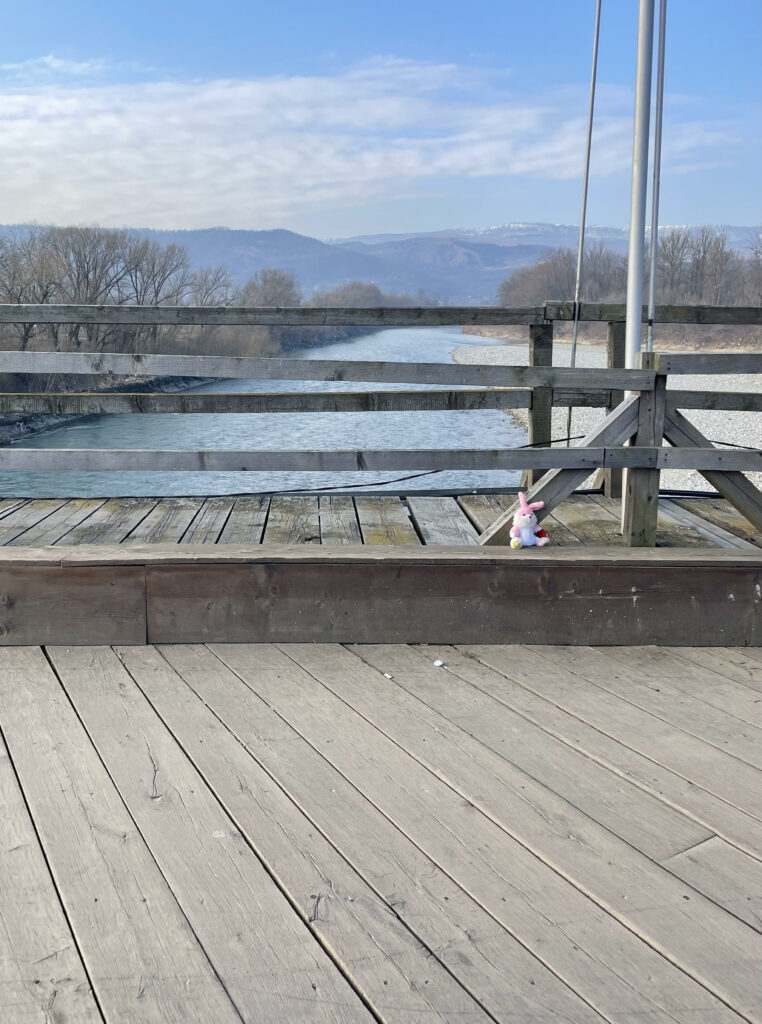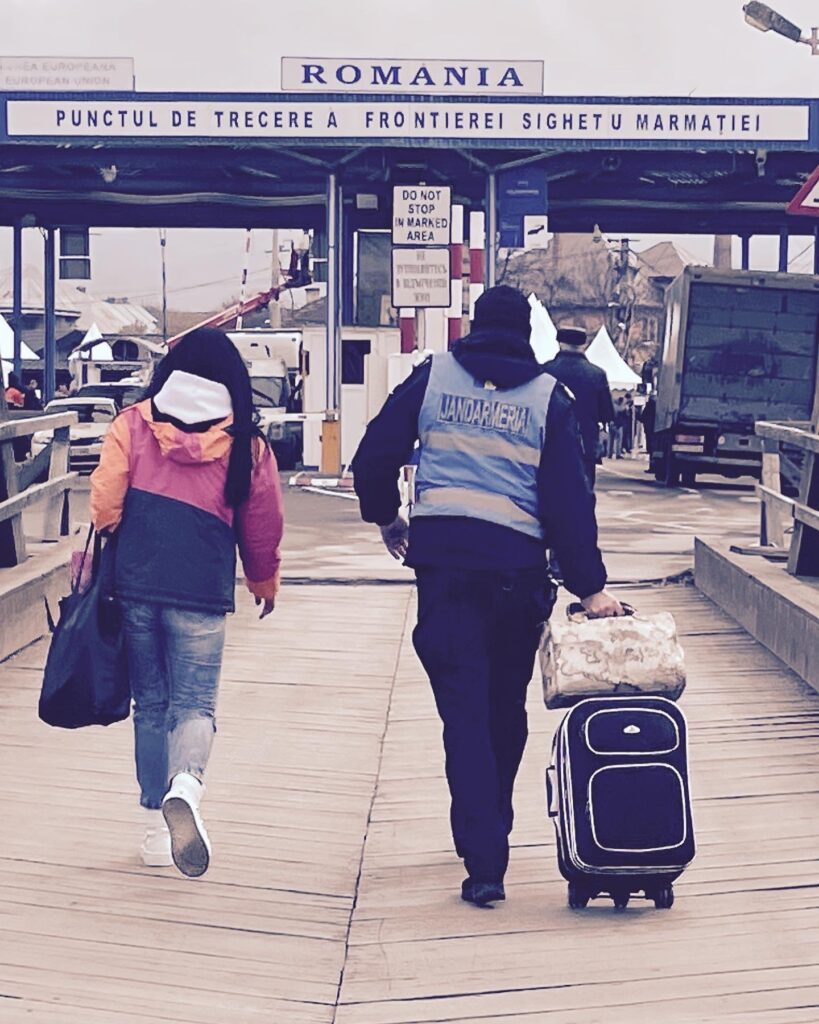Refugees coming from Ukraine walk at the Ukrainian-Romanian border in Siret on March 02, 2022. - Refugees from Ukraine flock into Romania to escape Russia's invasion -- and avoid massive jams at the Polish border. (Photo by Daniel MIHAILESCU / AFP) (Photo by DANIEL MIHAILESCU/AFP via Getty Images)
Light snow is falling as I cross the bridge over the Tisza River that runs along the border between Romania and Ukraine. This bridge is partly made of wood, with giant steel girders supporting it. Below, the small, cold river makes its way between the lumpy rocks on either side.
Refugees pass the other way as I walk across. Almost all of them pull a wheelie suitcase bag. These rattle endlessly over the wooden slats of the bridge. A cacophony of unhappiness and loss. Pedestrians get through the border far quicker than cars.
The cars are backed up for miles. One after the other, after the other. Audis containing glamorous women in shiny parkas, tapping at iPhones. Station wagons full of children. SUVs with dogs in the back. Old people in old cars. Old people in expensive cars.
Frustrated mothers struggling to keep their children under control. Quiet couples staring straight ahead. Women holding sleeping babies or cats. BMWs. Nissans. Ladas. VW’s. Skodas. Fords. KIAs. Peugeots. Black ones. Grey ones. Red ones. White ones. Endless. They have only one thing in common: they want to get out of Ukraine.
The wind is picking up as I approach the town of Solotvyno. An ancient taxi driver stops and attempts to give me a lift. Our attempt at communication is pitiful. My embarrassing French is of no use. None of the words that Google Translate offers in Ukrainian mean anything to him. We agree to part ways.
 Abandoned toy on bridge over Tisza River on the border between Ukraine and Romania. Photo: John Davenport
Abandoned toy on bridge over Tisza River on the border between Ukraine and Romania. Photo: John Davenport
I continue walking up the hill to Solotvyno. A group of policemen and security guards stand talking outside a bank. On several street corners groups of men are standing, talking and watching. It is only then that I realise how few men there had been in the cars at the border. The men are here. Waiting.
Foolishly, I start taking photos with my phone. The men from outside the bank surround me instantly.
“Who are you? Why are you here? What are you doing?”
I reply that I am a journalist. Which is partly true. I show them the “Press” card around my neck.
The main one says: “That’s nothing, I could have made that at home.” He has a point, because I did actually make it at home when a journalist friend said that the letter I had from the editor of the Mail & Guardian was great, but that a badge of some kind would be helpful.
“We are looking for Russian Army forward scouts, how do we know you aren’t one of them?”
The situation is deteriorating somewhat. I offer to show them the letter from my editor, but this is of little interest, probably because it too, could easily be made at home …
“Passport?” another one asks roughly.
I obediently produce my British passport. A magical document. Instantly they are friendliest of men. Asking me if I’m warm enough. Apologising. Offering direction. Telling me which areas to stay away from. And also suggesting that I immediately go back to Romania for my own safety. I naturally do not do this.
The road towards the train station is long and muddy. Everything is grey, grey, grey. So grey that it makes London in winter look like a Mardi Gras. An ancient grey Lada rattles past grey buildings, the pink duffle bag on its roof standing out like the red coat in Schindler’s List.
The town is silent as well as grey. Completely silent. Deserted. There is nobody anywhere. Nobody.
I get a message from one of the other writers I’ve met here. I tell him how deserted it is.
“Wow,” he says, “it’s almost like you’re in a war zone.” He has an admirably dry sense of humour — and I am forced to agree that he has a point.
I walk on and on. If Romania was a country of churches and pharmacies, Ukraine appears to be a country of churches, beauty salons and shops that sell sexy dresses. Cliches can be such a comfort when one is walking through a freezing cold, completely deserted war zone. I take particular joy in one called The Lady Shop.
And then I get lost. Very lost.
I walk along a highway. Past endless closed shops; supermarkets; hardware stores; furniture shops; flower shops; electrical shops; grocery shops; hardware shops; dress shops; shoe shops; hairdressers — all closed.
Clearly I’m getting more and more lost. Also I’m worried about looking like a Russian Army forward scout. What is a forward scout? What do they look like? I put on my glasses, hoping that forward scouts do not wear nerdy glasses.
I have no idea where I am. A railway. A ruined factory. A scrapyard. Empty fields. Empty everything. There aren’t even any beauty salons or shops that sell sexy dresses here. The men outside the bank said not to go north. Or was it the east? Probably the east. Am I walking east? Why is it so deserted?
Eventually I figure out where I am. Because Google maps starts working. I need to walk 8km south and I’ll be back in Solotvyno. It’s all so empty. I struggle to understand what sort of area this is. It seems to be a mixture of lumber yards and small factories between holiday resorts with empty swimming pools.
Nothing makes any sense to me. Why would one build a holiday resort between two small factories? I’m starting to realise how out of place I am. An empty water slide. An empty pool surrounded by empty sun loungers. Empty picnic tables. An empty saw mill. An empty factory. An empty snack bar. A rubbish dump that is empty, except for the rubbish.
I pass another shrine. This one features Jesus crucified on a shiny stainless-steel cross. Crucified on a stainless-steel cross? I don’t know what that means. But it means something.
I lose my phone signal again, and wander along a muddy lane between two abandoned houses. I walk on and on. Then I see something that looks familiar. Apartment buildings. A park. I feel much better now. And eventually I see the closed Lady Shop. Relief.
As I get back to the border there are suddenly people everywhere. All waiting to cross. I speak to an older woman from the heavily bombarded city of Kherson, she is standing next to her car with her cat. Her English isn’t great, but it’s a shit load better than my Ukrainian. She has been driving for two days. She had to stop to see her daughter, but her daughter wouldn’t leave no matter what her mother said.
I talk to a young mother whose children are clearly driving her mad. Sitting in a cold, stationary car with two toddlers? I can’t imagine how difficult that is. She is taking turns playing with each of them to stop them from screaming. She’s happy that she is near the front of the queue. She says it should only be about another eight hours till she crosses the border.
 A Ukrainian refugee crosses into Romania over the Tisza River, assisted by a Romanian policeman. Photo: John Davenport
A Ukrainian refugee crosses into Romania over the Tisza River, assisted by a Romanian policeman. Photo: John Davenport
Two sisters in a station wagon with a dog. They’ve driven from the north because they heard that the Polish border is so busy that it can take four days to cross. Their father and brother are fighting in the east. Their father is fine, but they haven’t heard from their brother in two days. They’re sure he is fine though, because he’s super-tough and in a defence unit with his best friend.
Next a Mercedes containing two women in their early 30s. They have full faces of make-up and pretty hair. They’re clearly not accustomed to talking to men unless they know them to be well-off, but I’m a confusing option for them. Journalists are poor, but at least I’m from the West, and their fine-honed radar is giving them mixed signals on my status.
The next car is full of students in a small bus. They have heard that they can continue their studies in Romania or Hungary, and their only concern is if they’ll be able to catch up in time. Education is how people from here make themselves not disposable, and they know this.
The last people I try to speak to are two old men who are smoking in an old Suzuki. They do not speak any English apart from “Hello” and “Putin no good”. Given the situation, that seems like more than enough English. They shake my hand warmly.
Being a pedestrian, I pass through the border quickly.
As I walk back over the River Tisza to Romania, a woman in front of me is battling with her wheelie bag. A Ukrainian border guard offers to help her, but a surge of independence prompts her to decline his offer.
She rattles on. A Romanian policeman offers to help.
Clearly exhausted, she accepts this time.